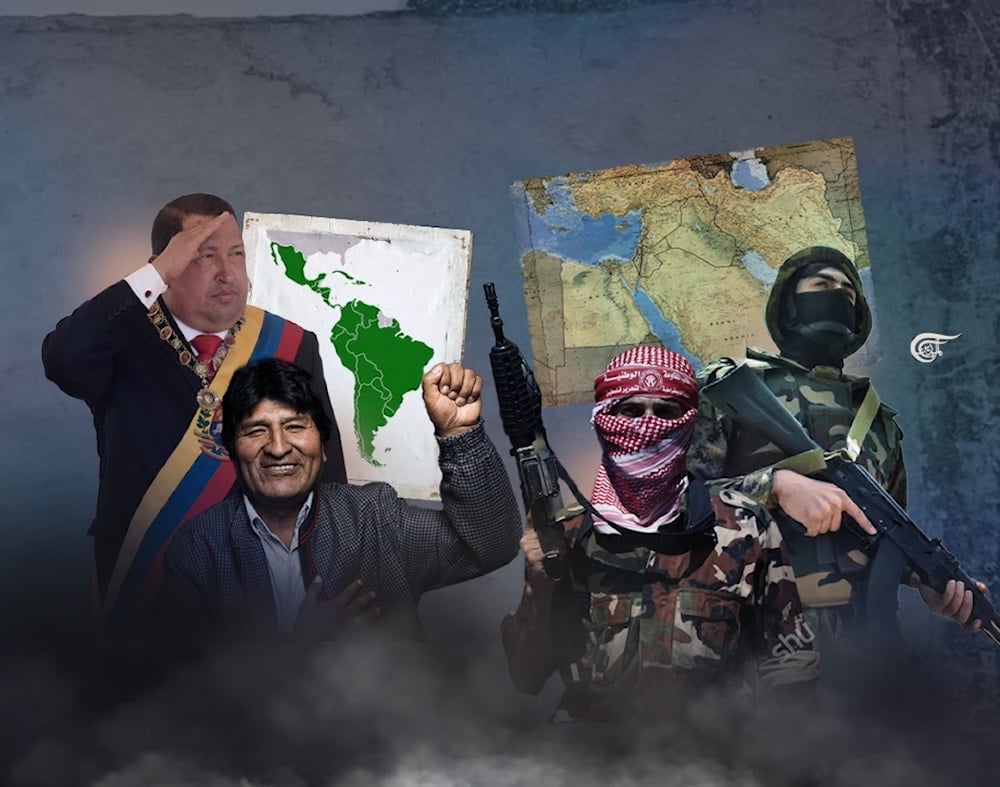Latin America’s leftward tendencies and lessons from its Middle Eastern counterparts
With around 70% of Latin American capitals tilting toward the left, there is little doubt that domestic policymaking has been influenced by similar ideologies, entities, and governments in the Middle East.
-

The parallels between Latin American governments and left-wing Middle Eastern resistance movements are stark (Illustrated by Zeinab al-Hajj; Al Mayadeen English)
Left-wing governments have gained a solid standing in Latin America. From Gabriel Boric’s Libertarian Socialist government in Chile to Ecuador’s Correismo government, countries have critiqued, realigned, and moved away from foreign policies that stifle their independence and make them de facto client states of the US. Accepting American hegemony is equated with blunders that will only result in greater chaos and destruction.
Ideologically, politically, and strategically, left-wing policy making and eschewing conservatism is the standard modus operandi for governments ranging from Santiago to Bogota. There is a concerted attempt to shelve populism and unilateral approaches for policy making, which results in just and equitable societies. Resources, which have been the source of conflicts and unjust Western interventions in countries such as Iraq, are also being indigenously managed, and emphasis is being placed on adequate mobilization and indigenous sovereignty over production and revenue generation.
It is also important to note that many Latin American governments and societies have drawn inspiration from Middle Eastern left-wing resistance movements, which have fought against colonialism, neocolonialism, and Western economic exploitation. Both regions have suffered considerably from unjust and unilateral interventions and resource extraction sprees from countries such as the United States, which has resulted in deeply fractured societies, inequities, and domestic power struggles. There is hence a recognition on both sides of the necessity to address social justice vacuums and the pernicious effects of imperialism.
Those who have championed the cause and drawn inspiration from left-wing movements in the Middle East include former leaders such as Hugo Chavez of Venezuela and Bolivia’s Evo Morales, who have lauded resistance groups such as Hezbollah as models of opposition to "Israel’s" barbarity and neocolonialism against the Palestinians. Morales also admired martyred Secretary-General Hassan Nasrallah and expressed solidarity with his views on defending Lebanon’s sovereignty and supporting Palestinian rights.
Much of this trend has continued in 2025 and exemplifies Latin America’s shift toward the left. Being at the receiving end of Western cooperation has not benefited local populations at the expense of elites, which has prompted many capitals to look elsewhere and cooperate with countries that are against American imperialism. Venezuela under Nicolas Maduro, for example, has signed multiple agreements with Iran including purchasing crude oil in 2025, while Tehran has extended support to Caracas on building refineries, localized industries, and the requisite infrastructure needed for commercial activities to take hold amid crippling US sanctions on both sides. Similarly, joint initiatives between Cuba (another victim of neocolonialism from the United States) and Middle Eastern countries have worked on expanding medical diplomacy, with thousands of Palestinian students gaining access to Cuban medical facilities, amid Marco Rubio’s imposition of visa bans on Cuban medical missions.
These realities indicate a pervading frustration with American hegemonic designs in Latin American capitals, including Santiago, where Gabriel Boric’s government has opted to strengthen its relationship with countries such as Mexico and Brazil (both with left-wing leaderships) amid Trump’s increasing isolationism, hyper capitalism, and pernicious tariff policies.
However, beyond foreign policy tilts are indigenous policy making, community empowerment initiatives, and legal frameworks that have been adopted and institutionalized by Latin American governments, which are also inspired by Middle Eastern left-wing movements.
Indigenous self-governance, leftist legal frameworks
One of the best examples is the Wampis Nation of Peru. Wampis is an autonomous territorial government focusing on defending the land rights of indigenous people, consolidating themselves in the country as a political entity. They have drawn inspiration from Palestinian liberation movements, such as the Democratic Front for the Liberation of Palestine (DFLP), a Maoist, Marxist, and Leninist organization which has fought alongside Hamas and allied Palestinian factions against "Israel’s" apartheid and genocide. Both the DFLP and the Wampis nation share collective experiences of dispossession and have responded by resisting foreign control of indigenous resources. Additionally, social hierarchies are considered impediments toward realizing equitable societies, with the Wampis Nation agitating against ‘unjust exploitation’ of multinational corporations in the country. Similarly, the DFLP condemns multinational corporations for funding "Israel’s" genocide through arms sales and establishing commercial ties with the settlement enterprise.
Furthermore, there are legal frameworks in place for such left-wing communities to become political entities. Active endorsement by the governments includes Colombian President Gustavo Petro’s left-wing Humana government, which accorded recognition to indigenous councils as local governments operating in the country.
Nationalization of resources
Then comes the trend of the nationalization of economic resources in Latin America, which comes in response to crass Western capitalism benefiting the coffers of Western multinational corporations and promoting fractured, impoverished, and divided societies. Mexico is one such example, as it continues to reel from drug cartels, a breakdown in law and order, and an impending crisis from Donald Trump’s pernicious tariff regime. Under Claudia Sheinbaum’s Leftist, Morena party, Mexico is carrying forward the legacy of President Andres Manuel Lopez Obrador of the Party of Democratic Revolution, who decided to nationalize lithium, which constitutes 1.7 million tons in the country. This is similar to the Islamic Republic of Iran establishing government control over its oil reserves by establishing state-backed enterprises.
The parallels between Latin American governments and left-wing Middle Eastern resistance movements are hence stark. With around 70% of Latin American capitals ranging from Chile to Brazil tilting toward the left, there is little doubt that domestic policymaking has been influenced by similar ideologies, entities and governments in the Middle East. If current trends continue, more work will be done toward realizing a just, equitable, and sovereign future for all concerned.

 Hamzah Rifaat
Hamzah Rifaat
 6 Min Read
6 Min Read











